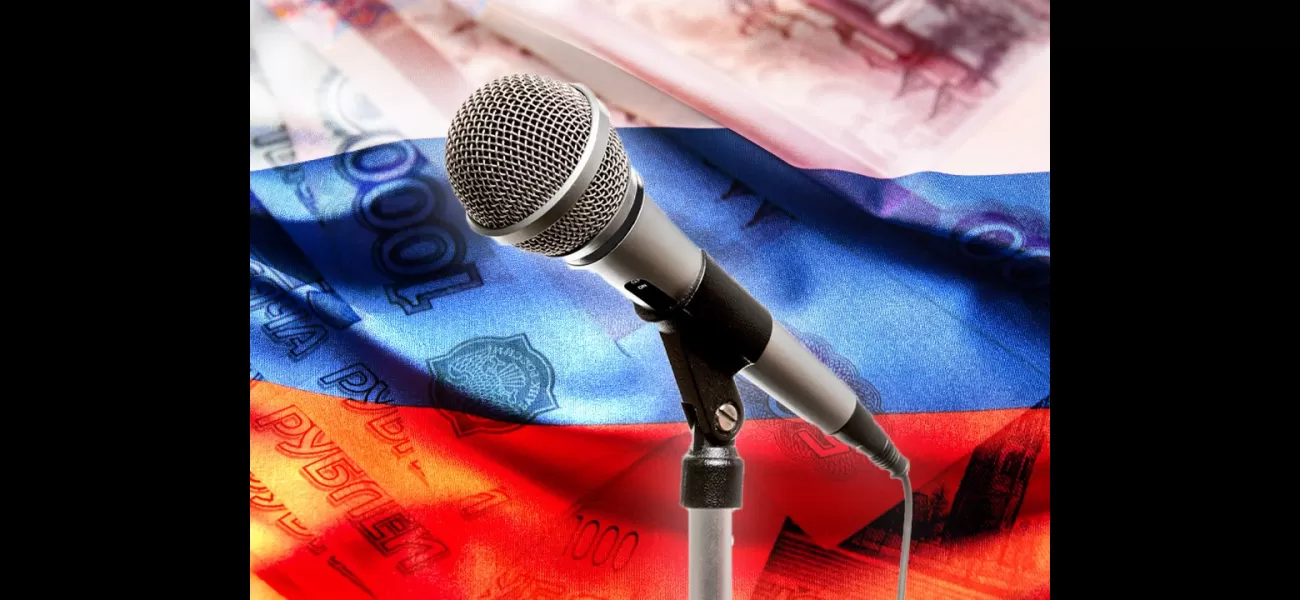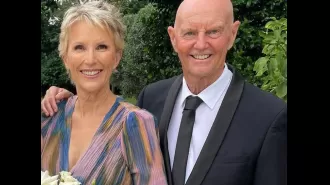Russian comedians earn high salaries like footballers, but there is a dark side to it.
They have a lot of money.
August 14th 2024.

When we hear the word "Russia," our minds usually don't jump to thoughts of comedy. In fact, it's probably the last thing we would associate with the country. But little do many know, there is actually a thriving stand-up scene in Russia where comedians can make up to £1,000,000. That's a significant difference from the humble earnings of Edinburgh Fringe comedians, but what's even more interesting is that these Russian comedians are also seen as a mouthpiece for President Putin.
One such comedian, Milo Edwards, started his comedy journey like many others, at the Cambridge Footlights. However, his path has been far from ordinary. After graduating from university in 2015, Milo made the bold decision to move to Russia. Little did he know that this move would lead him to perform as a stand-up comedian on Russian TV.
Yes, he did make jokes about Putin. And no, he definitely can't do that now. Milo shares, "I taught myself Russian while I was in university. One of my close friends was Russian and we went to Moscow a few times, so I became interested in the language and culture." He continues, "I thought if I spent a year in Russia, I would become fluent. And that's exactly what happened. I was then scouted to perform stand-up in English at a bar in Moscow, and from there, I landed a job on Russian TV."
Wait, what? How did that even happen? Milo explains, "I had a screen test and ended up on a show similar to the American show, 'Last Comic Standing.' I came in second place, and then I was offered a spot on their version of 'Live at the Apollo.' I did that for two years before returning home."
Performing stand-up comedy in Russian on TV was definitely a unique experience for Milo, and just the day before our interview, he had run into a friend from his time in Russia. He shares, "I yelled his name in Russian and he looked terrified, like he was about to be arrested." Milo's show, "How Revolting! Sorry to Offend" is currently playing at the Edinburgh Fringe until the end of the month.
Reflecting on his time in the Russian stand-up scene, Milo is tempted to describe it as "primitive," but he believes that's not quite the right word. He explains, "It's still a very new concept in Russia. Stand-up only started being shown on TV in 2012, so before that, not many people knew about it. But once it became popular, there was no underlying culture of stand-up to support it."
Milo elaborates, "So there were a few comedians who were on TV, but their material was more in line with the one-liners of the 70s and 80s. But then, some of them would go to the West and see what other comedians were doing, and that's when you would see a mix of old and new styles, with a touch of postmodern Stewart Lee influence."
While performing in Moscow was generally a good experience, the further you ventured into isolated Russian towns and cities, the more unpredictable the audiences became. Milo shares a memorable experience, "I once performed in a town that was often the butt of 'sh**ty town' jokes. But it did have a McDonald's, which was a sign of safety in Russia. If there was no McDonald's, you were in trouble."
He continues, "The gig was in a restaurant, which was a popular venue for stand-up in Russia. There were 300 people sitting at tables in a dining hall, and it was a mixed bill of stand-up and singing. I had to go on after two women pole dancing in leotards while an old lady sang Soviet ballads."
Milo found performing in Russia more enjoyable than in England, as most Russians didn't attend English-speaking gigs to laugh, but rather to practice their English skills and applaud if they understood a joke. However, in 2015, comedy in Russia was censored, not necessarily for political reasons, but for socially conservative ones. Milo explains, "In live performances, you could pretty much say whatever you wanted. But on TV, there were restrictions on topics like sex, drugs, and anything related to the LGBTQ+ community."
He continues, "One of the strange rules was that you could talk about drugs, but you couldn't give advice on how to take them. For example, you could say you indulged in cannabis, but you couldn't say you smoked it because that would be seen as instructing people on how to take it."
Surprisingly, making jokes about Putin was allowed, as Milo explains, "People who loved Putin would find the jokes funny because they would interpret them in the opposite direction. It was a way to play both sides. I remember once making a joke about sh***y Russian restaurants and referencing Putin. People who disliked Putin would laugh because they knew he was capable of murder, while those who loved him would laugh because they thought it was ridiculous to think he would do such a thing."
Milo left Russia in 2017, and most of his friends also moved away after the country's invasion of Ukraine in 2022. However, a few stayed behind due to the high salaries they were earning as comedians. Milo shares, "I spoke to one of my friends who left, but another friend signed a contract that basically said, 'We'll give you £1,000,000 to shut up. You do our shows, you do what we say when we say it, and we'll pay you like a footballer.'"
He continues, "It's usually the younger comedians on TV who are making this kind of money. With so many established comedians leaving the country, the competition became less intense, and these younger acts rose to fame. The Russian equivalent of Michael McIntyre left during the war, so there was a huge vacuum for new acts. And now, these younger comics are filling the shoes of comedians who were 20 years older than them."
As for Milo, he has no plans to return to Russia anytime soon. While he enjoyed living there, he believes it's not the safest place for him at the moment. He shares, "It's a great country, aside from the way it's run. I wouldn't feel confident or safe going back there right now. I have a tendency to speak my mind, and that's not a good thing to do in Russia. When I was there, people wouldn't usually bother foreigners, but that's not the case anymore."
One such comedian, Milo Edwards, started his comedy journey like many others, at the Cambridge Footlights. However, his path has been far from ordinary. After graduating from university in 2015, Milo made the bold decision to move to Russia. Little did he know that this move would lead him to perform as a stand-up comedian on Russian TV.
Yes, he did make jokes about Putin. And no, he definitely can't do that now. Milo shares, "I taught myself Russian while I was in university. One of my close friends was Russian and we went to Moscow a few times, so I became interested in the language and culture." He continues, "I thought if I spent a year in Russia, I would become fluent. And that's exactly what happened. I was then scouted to perform stand-up in English at a bar in Moscow, and from there, I landed a job on Russian TV."
Wait, what? How did that even happen? Milo explains, "I had a screen test and ended up on a show similar to the American show, 'Last Comic Standing.' I came in second place, and then I was offered a spot on their version of 'Live at the Apollo.' I did that for two years before returning home."
Performing stand-up comedy in Russian on TV was definitely a unique experience for Milo, and just the day before our interview, he had run into a friend from his time in Russia. He shares, "I yelled his name in Russian and he looked terrified, like he was about to be arrested." Milo's show, "How Revolting! Sorry to Offend" is currently playing at the Edinburgh Fringe until the end of the month.
Reflecting on his time in the Russian stand-up scene, Milo is tempted to describe it as "primitive," but he believes that's not quite the right word. He explains, "It's still a very new concept in Russia. Stand-up only started being shown on TV in 2012, so before that, not many people knew about it. But once it became popular, there was no underlying culture of stand-up to support it."
Milo elaborates, "So there were a few comedians who were on TV, but their material was more in line with the one-liners of the 70s and 80s. But then, some of them would go to the West and see what other comedians were doing, and that's when you would see a mix of old and new styles, with a touch of postmodern Stewart Lee influence."
While performing in Moscow was generally a good experience, the further you ventured into isolated Russian towns and cities, the more unpredictable the audiences became. Milo shares a memorable experience, "I once performed in a town that was often the butt of 'sh**ty town' jokes. But it did have a McDonald's, which was a sign of safety in Russia. If there was no McDonald's, you were in trouble."
He continues, "The gig was in a restaurant, which was a popular venue for stand-up in Russia. There were 300 people sitting at tables in a dining hall, and it was a mixed bill of stand-up and singing. I had to go on after two women pole dancing in leotards while an old lady sang Soviet ballads."
Milo found performing in Russia more enjoyable than in England, as most Russians didn't attend English-speaking gigs to laugh, but rather to practice their English skills and applaud if they understood a joke. However, in 2015, comedy in Russia was censored, not necessarily for political reasons, but for socially conservative ones. Milo explains, "In live performances, you could pretty much say whatever you wanted. But on TV, there were restrictions on topics like sex, drugs, and anything related to the LGBTQ+ community."
He continues, "One of the strange rules was that you could talk about drugs, but you couldn't give advice on how to take them. For example, you could say you indulged in cannabis, but you couldn't say you smoked it because that would be seen as instructing people on how to take it."
Surprisingly, making jokes about Putin was allowed, as Milo explains, "People who loved Putin would find the jokes funny because they would interpret them in the opposite direction. It was a way to play both sides. I remember once making a joke about sh***y Russian restaurants and referencing Putin. People who disliked Putin would laugh because they knew he was capable of murder, while those who loved him would laugh because they thought it was ridiculous to think he would do such a thing."
Milo left Russia in 2017, and most of his friends also moved away after the country's invasion of Ukraine in 2022. However, a few stayed behind due to the high salaries they were earning as comedians. Milo shares, "I spoke to one of my friends who left, but another friend signed a contract that basically said, 'We'll give you £1,000,000 to shut up. You do our shows, you do what we say when we say it, and we'll pay you like a footballer.'"
He continues, "It's usually the younger comedians on TV who are making this kind of money. With so many established comedians leaving the country, the competition became less intense, and these younger acts rose to fame. The Russian equivalent of Michael McIntyre left during the war, so there was a huge vacuum for new acts. And now, these younger comics are filling the shoes of comedians who were 20 years older than them."
As for Milo, he has no plans to return to Russia anytime soon. While he enjoyed living there, he believes it's not the safest place for him at the moment. He shares, "It's a great country, aside from the way it's run. I wouldn't feel confident or safe going back there right now. I have a tendency to speak my mind, and that's not a good thing to do in Russia. When I was there, people wouldn't usually bother foreigners, but that's not the case anymore."
[This article has been trending online recently and has been generated with AI. Your feed is customized.]
[Generative AI is experimental.]
0
0
Submit Comment





